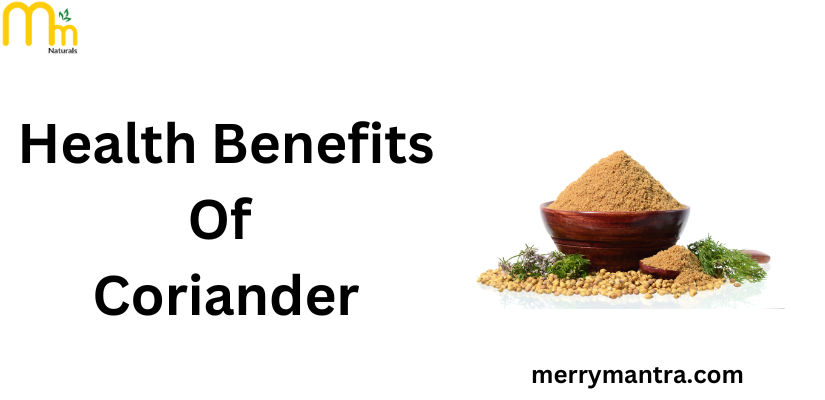In today’s blog, we will discover the 8 best health benefits of coriander which will help a wide range of individuals to recover from certain health complications. Let’s get started!
Coriander is a well-known aromatic herb which comes from a plant of the Apiaceae family. It is considered one of the oldest plants because of its tempting and appealing bright green color which it offers in many dishes.
Fresh coriander leaves, also referred as cilantro in some countries, are grown by sowing the seeds in the container or ground. After watering and fertilization, harvest the leaves or stems as needed, leaving the root in the soil, and use it as your garnishing component in recipes.
If you want to cultivate the seeds, then rub off the seeds from the stem of the plant and rinse them in a strainer to remove debris. Properly store the seeds in a container for further use in foods. Coriander seeds or leaves are annual and pretty plants that may be used as a traditional medicine. The aroma and unique flavor have multiple advantages for well-being.
Explore 8 Health Benefits of Coriander for a Healthy Body
Here, we have listed the top 8 advantages of consuming coriander in your everyday meal.
1. Improves Digestion
Coriander helps in the secretion of digestive juices and enzymes in the stomach that stimulate digestion motion. Oil extracted from this component promotes healthy digestion. It also reduces inflammation in the digestive tract and offers gut bacteria benefits with its antioxidants and fiber properties.
According to an 8-week study, it is found that 32 individuals who have taken 30 drops of herbal medicine that contains coriander have significantly lower IBS (irritable bowel syndrome), discomfort, abdominal pain, and bloating. Additionally, research concluded that it also increases appetite in certain people.
2. Promotes Heart Health
It is observed that coriander benefits heart health by reducing risk factors such as cholesterol levels and high blood pressure. This component is known to be a diuretic because it lowers the blood pressure by eliminating excess water and sodium from the body.
Moreover, few studies conducted on rats indicate that coriander regulates high cholesterol levels in people. It was shown that coriander reduces the bad cholesterol (LDL) and significantly increases the good cholesterol (HDL) which acts as a defensive line against critical conditions like atherosclerosis and heart attacks.
3. Helps to Reduce Blood Sugar
Coriander manages sugar levels in patients experiencing type-2 diabetes. It promotes enzyme activity and enhances insulin secretion which may reduce the risk of diabetes.
However, it is important to consider that individuals who consume diabetes medicines or have low blood sugar levels should be aware of eating coriander as it may take down the level of glucose level.
4. Boosts Brain Health
One of the main health benefits of coriander is to enhance brain health which may protect against brain disorders. It works as a safeguard against various brain diseases.
For instance, multiple sclerosis, Parkinson’s, and Alzheimer. The anti-inflammatory and antioxidant properties of coriander extract also regulate in protection of nerve cell damage.
Eating these pungent herbs or seeds of coriander improves memory and manages anxiety in people.
5. Easy to include in your Diet
The pleasant aroma and flavor of coriander is edible, although the leaves and seeds taste distinctly. Some people find that the coriander leaves have a citrus, pungent, and soap-like taste.
These leaves can be used as a garnishing element in foods such as salads, pastas, lentils, etc. Moreover, you can make a puree with the leaves by adding peanuts, garlic, or others to make it in a paste form for salad or any other dishes.
While the seeds contain an earthy taste, they come in whole or powder form. The whole seeds may be added to pickled vegetables, baked foods, roasted vegetables, and so on.
6. Rich in Antioxidants, Antibacterial and Anti-inflammatory Properties
This element comes with numerous antioxidant properties which help to prevent cellular damage caused due to free radicals. It also protects against the inflammation in your body.
Coriander also possesses immune-boosting, neuroprotective, and anticancer effects with compounds such as quercetin, tocopherols, and terpinene. It is also shown that it reduces the growth of breast, prostate, colon, and lung cancer cells. The anti-inflammatory properties also alleviates signs of asthma, allergies, and arthritis.
The antibacterial compounds of this element, like duodenal, help to fight salmonella, a food-borne illness. This condition may cause combat urinary tract infection and food poisoning in individuals.
7. Protects Skin and Hair
Coriander contains a wide range of irons and vitamin A, K, and E which fights against radicals to prevent damage such as dermatitis (skin rashes).
Some of individuals also use coriander leaf juice to treat conditions like pigmentation, aging, acne, dryness, and oiliness. It also protects from ultraviolet B radiation caused by cell damage.
The extraction of coriander nourishes the hair follicles and hydrates the scalp to reduce hair fall. It also minimizes problems such as itchy scalp and dandruff with the coriander soothing effects.
It fights fungal infections that may affect the growth and overall well-being of the scalp. Coriander stimulates blood flow which promotes more voluminous and thicker hair.
8. Improve Kidney Functioning
Coriander improves kidney function by increasing the filtration rate that treats urinary tract infections, which allows for draining out microbes and toxins and enabling faster production of urine.
Moreover, it reduces the risk of disease or kidney damage by supporting the natural filtering process.
Conclusion
In conclusion, coriander has numerous health-promoting benefits and culinary uses. Whether through extracts, leaves, and seeds you should incorporate this element into your daily meal routine.
Read More:- https://www.webmd.com/diet/health-benefits-coriander
If you want to use coriander to treat any medical condition, then it is recommended to consult a healthcare expert before taking it.

